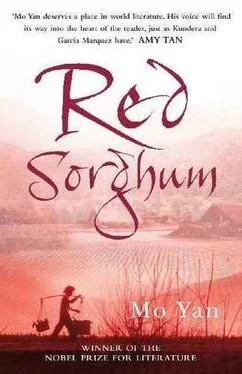Armed Jap and puppet soldiers stood on the fringes of the construction site; the overseer, whip in hand, roamed the site like a spectre. The eyes of the frightened labourers rolled as they watched Uncle Arhat, his head a mass of blood and mud, pick up a rock and take a couple of steps. Suddenly he heard a crack behind him, followed by a drawn-out, stinging pain on his back. He dropped the rock and looked at the grinning overseer. ‘Your honour, if you have something to say, say it. Why hit me?’
Without a word, the grinning overseer flicked his whip in the air and wrapped it around Uncle Arhat’s waist, all but cutting him in half. Two streams of hot, stinging tears oozed out of the corners of Uncle Arhat’s eyes, and blood rushed to his head, which began to throb as though it might split open.
‘Your honour!’ Uncle Arhat protested.
His honour whipped him again.
‘Your honour,’ Uncle Arhat said, ‘why are you hitting me?’
His honour flicked the whip and grinned until his eyes were mere slits: ‘Just giving you a taste, you son of a bitch.’
Uncle Arhat choked off his sobs as his eyes pooled with tears. He bent over, picked up a large rock from the pile, and staggered with it towards the little bridge. The jagged edges dug deeply into his gut and his rib cage, but he didn’t feel the pain.
The overseer stood rooted to the spot, whip in hand, and Uncle Arhat trembled with fear as he lugged the rock past his gaze. With the whip cutting into his neck he fell forward, landed on his knees, and hugged the rock to his chest. It tore the skin on his hands and left a deep gash in his chin. Stunned, he began to blubber like a baby; a purple tongue of flame licked out in the emptiness inside his skull.
He strained to pull his hands out from under the rock, stood up, and arched his back like a threatened, skinny old tomcat. Just then a middle-aged man, grinning from ear to ear, walked up. He took a pack of cigarettes out of his pocket and held one up to the overseer, who parted his lips to accept the offering, then waited for the man to light it for him.
‘Revered one,’ the man said, ‘that stinking blockhead isn’t worth getting angry over.’
The overseer exhaled the smoke through his nose and said nothing. Uncle Arhat stared at the whip in his twitching yellowed fingers.
The middle-aged man stuffed the pack of cigarettes into the pocket of the overseer, who seemed not to notice; then, snorting lightly, he patted his pocket, turned, and walked away.
‘Are you new here, elder brother?’ the man asked.
Uncle Arhat said he was.
‘You didn’t give him anything to grease the skids?’
‘Those mad dogs dragged me here against my will.’
‘Give him a little money or a pack of cigarettes. He doesn’t hit the hard workers, and he doesn’t hit the slackers. The only ones he hits are those who have eyes but won’t see.’
All that morning, Uncle Arhat desperately lugged rocks, like a man without a soul. The scab on his scalp, baked by the sun, caused terrible pain as it dried and cracked. His hands were raw and bloody, and the stiffened gash on his chin made him drool. The purplish flame kept licking at the inside of his skull — sometimes strong, sometimes weak, but never dying out completely.
At noon a brown truck drove up the barely negotiable road. Dimly Uncle Arhat heard a shrill whistle and watched the labourers stumble up to the truck. He sat mindlessly on the ground, showing no interest in the truck. The middle-aged man walked over and pulled him to his feet. ‘Elder brother, come on, it’s mealtime. Try some Japanese rice.’
Uncle Arhat stood up and followed him.
Large buckets of snowy white rice were handed down from the truck, along with a basket of white ceramic bowls with blue floral patterns. A fat Chinese stood next to the baskets, handing bowls to the men as they filed past. A skinny Chinese stood beside the buckets, ladling rice. The labourers stood around the truck, wolfing down their food, bare hands serving as chopsticks.
The overseer walked up, whip in hand, the enigmatic grin still on his face. The flame in Uncle Arhat’s skull blazed, illuminating thoughts of the hard morning that he had tried to cast off. Armed Japanese and puppet sentries walked up and stood around a galvanised-iron bucket to eat their lunch. A guard dog with a long snout and trimmed ears sat behind the bucket, its tongue lolling as it watched the labourers.
Uncle Arhat counted the dozen or so Japs and the dozen or so puppet soldiers standing around the bucket eating their lunch; the word ‘escape’ flashed into his mind. Escape! If he could make it to the sorghum field, these fuckers wouldn’t be able to catch him. The soles of his feet were hot and sweaty; the moment the idea to flee entered his mind, he grew fidgety and anxious. Something was hidden behind the calm, cold grin on the face of the overseer. Whatever it was, it made Uncle Arhat’s thoughts grow muddled.
The fat Chinese took the bowls from the labourers before they were finished. They licked their lips and stared longingly at kernels of rice stuck to the sides of the buckets, but didn’t dare move. A mule on the northern bank of the river brayed shrilly. Uncle Arhat recognised the familiar sound. Tethered to rolling stones beside the newly ploughed roadbed, the listless mules nibbled stalks and leaves of sorghum that had been trampled into the earth.
That afternoon a man in his twenties darted into the sorghum field when he thought the overseer wasn’t looking. A bullet followed his path of retreat. He lay motionless on the fringe of the field.
The brown truck drove up again as the sun was sinking in the west. Uncle Arhat’s digestive system, used to sorghum, was intent on ridding itself of this mildewy white rice, but he forced the food past the knots in his throat. The thought of escape was stronger than ever; he longed to see his own compound, where the pungent odour of wine pervaded the air, in that village a dozen or so li away. The distillery hands had all fled with the arrival of the Japanese, and the wine cooker now stood cold. Even more he longed to see my grandma and my father. He hadn’t forgotten the warmth and contentment she had bestowed upon him alongside the pile of sorghum leaves.
After dinner the labourers were herded into an enclosure of fir stakes covered with tarpaulins. Wires the thickness of mung beans had been strung between the stakes, and the gate was made of thick metal rods. The Jap and puppet soldiers were billeted in separate tents several yards away; the guard dog was tethered to the flap of the Jap tent. Two lanterns hung from a tall post at the entrance of the enclosure, around which soldiers took turns at sentry duty. Mules and horses were tethered to posts in a razed section of the sorghum field west of the enclosure.
The stench inside the enclosure was suffocating. Some of the men snored loudly; others got up to piss in a tin pail, raising a noisy liquid tattoo, like pearls falling onto a jade plate. The lanterns cast a pale light, under which the sentries’ long shadows flickered.
As the night stretched on, the cold became unbearable, and Uncle Arhat couldn’t sleep. With his thoughts focused on escape, he lay there not daring to move; eventually he fell into a muddled sleep. In his dream his head felt as though it were being carved by a sharp knife, while his hand felt seared as if he clasped a branding iron. He awoke covered in sweat; his pants were soaked with piss. The shrill crow of a rooster floated over from the distant village. The mules and horses pawed the ground and snorted. Stars winked slyly through holes in the tattered tarpaulin above him.
The man who had come to his aid that day quietly sat up. Even in the relative darkness of the enclosure, Uncle Arhat could see his blazing eyes, and could tell that he was no ordinary man. He lay there, watching silently.
Читать дальше












